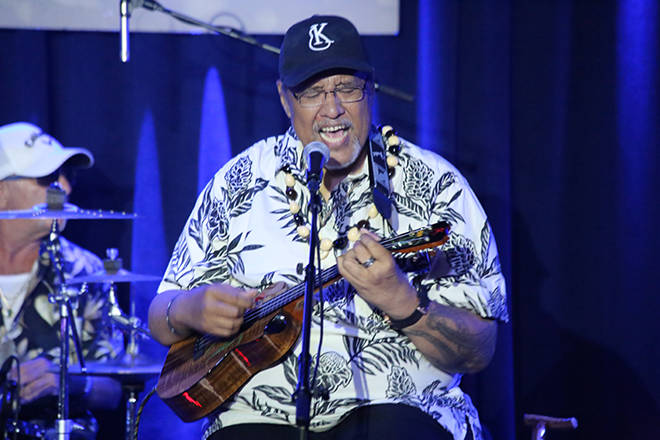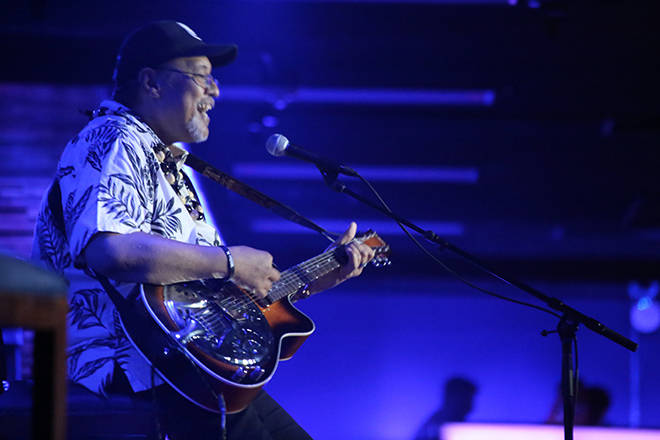Hawaiian music legend Willie K dies at age 59 after 2-year battle with cancer


COURTESY BLUE NOTE
Hawaii music legend Willie K died Monday night at his home on Maui after a two-year battle with cancer at age 59, his family announced in a Facebook post.

COURTESY BLUE NOTE Willie K. died Monday night at his home on Maui after a two-year battle with cancer. He was 59. William Awihilima Kahaiali‘i Died May 18, 2020



Social media lit up with fond memories and messages of support Tuesday following an announcement late Monday night on Facebook and Instagram that Hawaiian music superstar Willie K — a multi-Hoku Award-winning musician, vocalist, songwriter and record producer — had died at his home on Maui after a two-year battle with cancer. He was 59.
“We are sad to announce that Willie K has passed away on Monday night (May 18th) in his home in Wailuku surrounded by his ohana,” according to an announcement on his Facebook and Instagram accounts.
Willie K was diagnosed with small-cell cancer in his upper right lung in early 2018.
>> PHOTO GALLERY: Hawaiian music legend Willie K (1960 – 2020)
“He fought hard for over 2 years while still performing. In mid-February of this year, he was hospitalized for pneumonia which caused complications with his lung cancer,” his family wrote in the posts. “He was in positive spirits and doing okay, and he was looking forward to performing again. He then suddenly turned for the worse and lost his battle.”
The family thanked everyone “for all the love, support and prayers you have given.”
Don't miss out on what's happening!
Stay in touch with breaking news, as it happens, conveniently in your email inbox. It's FREE!
Many local politicians issued statements honoring Willie K.
U.S. Sen. Brian Schatz recalled him as a man who had “bridged blues and Hawaiian, local and mainstream, music and culture. Willie K blazed a trail that redefined music in Hawai‘i and helped other local artists succeed. … While he will be greatly missed, his music will live on.”
Gov. David Ige accurately described him as “a unique talent whose huge voice effortlessly ranged from Hawaiian music and the blues to opera — all in one performance.”
Maui Mayor Michael Victorino remembered him as a man who “fought cancer bravely for two years, still choosing to perform and entertain fans even while ill. He was generous with his time and immense talent. … We mourn a great loss for our community. He will truly be missed but never forgotten.”
Honolulu Mayor Kirk Caldwell also hailed Willie K’s commitment to his music and to Hawaii: “What he revealed in his last years was the sheer courage and stamina that it takes to perform while seriously ill. … Honolulu is mourning the loss of a great man, a son of Hawaii, but we are also feeling privileged to have known his grace.”
Two-time Grammy Award winner Kalani Pe‘a described himself as “heartbroken” at the death of a man he described as both a role model and a teacher.
“He always taught me to be authentic, to be real and to be true to myself and others,” Pe‘a said Tuesday on a phone call. “He was very straightforward, but he always taught me never, ever, ever try to please every single person. You’re not going to please everybody; just be you and do what you do best.”
Music historian Harry B. Soria Jr. spoke for many in saying simply, “There may never be another Willie K, with such raw yet polished talent.”
Born William Awihilima Kahaiali‘i on Oahu on Oct. 17, 1960, Willie K grew up on Maui and started working with his father, veteran musician Manu Kahaiali‘i, when he was 11.
By the time he graduated from Lahainaluna High School in 1979, he was playing everything from Top 40 and Latin to American country music and the classic rock of Jimi Hendrix. He spent several years in California where he expanded his musical repertoire further to embrace everything from European-American classical music to acid rock.
Willie K exploded on the Hawaii music scene in 1991 after Kelly “Kelly Boy” De Lima saw him playing in a bar on Maui. De Lima and his manager, Ken “KT” Thompson, signed him to a record deal with KDE Records and persuaded him to move to Oahu.
“What I saw in him was a talent far beyond what you would expect,” De Lima reminisced Tuesday. “‘Incredible’ — I don’t know if that’s a strong enough word, but the versatility that he had — he could do these sweet little Hawaiian ballads and bring the house down with that, and then he could jump on the guitar and do Jimi Hendrix.”
Waikiki entertainment scene veteran Jack Law brought Willie K to Waikiki when he booked him for a weekly engagement at Malia’s Cantina on Lewers Street. Playing Malia’s launched Willie K as an island superstar. The release of his debut album, “Kahaiali‘i,” increased his star power and won him his first of five Na Hoku Hanohano Awards.
Law remembered him as “the most talented person to come out of Hawaii since Bette Midler.”
“He had a great sense of humor. When he was nominated for his first Hoku Awards (in 1992), he asked for me to come along, so I was sitting with him and his parents at the table. After that, whenever he performed for the LGBT community — and he performed in public a lot for the LGBT community — he would always say that I had been his ‘date’ at his first Hoku Awards.”
Pierre Grill, the veteran studio engineer and multi-instrumentalist who co- produced “Kahaiali‘i,” recalled him as “the best musician I ever recorded with.”
Willie K’s next three albums reaffirmed his place as one of the most versatile — and popular — performers in local music. Then, a move to another label almost ended his career as a recording artist.
But he came back in a big way in 1997 when the Mountain Apple Co. retained him to resurrect the career of singer Amy Hanaiali‘i Gilliom after her first album for the label had gone almost unnoticed.
With Willie K as her producer and mentor, Gilliom switched from singing mainstream pop to traditional Hawaiian falsetto. Gilliom was an instant hit, and a string of Hoku Award-winning albums followed — several of them recorded by the new duo of Amy Hanaiali‘i & Willie K.
In 2000 the Hawai‘i Academy of Recording Arts made a rule change that suddenly defined “Nostalgia,” an album recorded by Hanaiali‘i & Willie K, as the work of a female vocalist rather than the work of a duo; Willie K became the first male performer in HARA history to be one-half of a duo that won an award as a “female vocalist.” (The rule change was later reversed.) That same year, he also received a well-deserved solo Hoku for his imaginative Christmas album, “Willie Kalikimaka.”
Shortly after that he returned to Maui and recorded and released a two-CD live album that captured his roots-rock repertoire. He then established a new record label, Maui Tribe, and released an album of traditional Hawaiian music.
In 2003 he reunited with Gilliom for a concert tour that produced a live album in 2004 and became one of the five finalists for the newly created Hawaiian music category at the Grammy Awards in 2005.
Back on Maui he formed a new duo, Barefoot Natives, with Gilliom’s brother, Eric Gilliom. The duo’s self-titled debut album won a Hoku Award (contemporary Hawaiian album) in 2005.
In the years that followed, Willie K continued to enjoy a prolific and eclectic career as a recording artist, concert headliner, record producer, film actor and event promoter. Another reunion with Hanaiali‘i produced an aptly titled album, “Reunion,” and earned them another Hoku Award in 2015.
Willie K received the Hawai‘i Academy of Recording Arts Lifetime Achievement Award in 2018.
An important part of his legacy is the example he set for younger musicians as a role model and mentor.
“I saw Willie K once when I was 9,” Hoku Award winner Kamuela Kahoano said. “I knew even back then there was something greater about his performances — and I have been chasing that level ever since. We can’t all rock forever, but what Willie K did — how hard he jammed, with unbridled passion, and his unforgettable local repertoire, that massive contribution and staying power — that’s why he’s a legend to me.”
Willie K is survived by his wife, Debbie Kahaiali‘i, and children, Karshaun, Max, Lycettiana and Antoinette.
A celebration of his life will be announced at a later time, the family said.



